|
|
|
Sort Order |
|
|
|
Items / Page
|
|
|
|
|
|
|
| Srl | Item |
| 1 |
ID:
117632
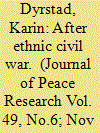

|
|
|
|
|
| Publication |
2012.
|
| Summary/Abstract |
While the study of the causes of civil war is a well-established subdiscipline in international relations, the effects of civil war on society remain less understood. Yet, such effects could have crucial implications for long-term stability and democracy in a country after the reaching of a peace agreement. This article contributes to the understanding of the effects of warfare on interethnic relations, notably attitudes of ethno-nationalism. Two hypotheses are tested: first, that the prevalence of ethno-nationalism is higher after than before the war, and second, that individuals who have been directly affected by the war are more nationalist than others. The variation in ethno-nationalism is examined over time, between countries, and between ethnic groups. Three countries that did not experience conflict on their own territory serve as a control group. The effect of individual war exposure is also tested in the analysis. Sources include survey data from the former Yugoslavia in 1989, shortly before the outbreak of war in Croatia and Bosnia and Herzegovina, and in 2003, some years after the violence in the region ended. Contrary to common beliefs, the study shows that ethno-nationalism does not necessarily increase with ethnic civil war. The individual war experiences are less important than expected.
|
|
|
|
|
|
|
|
|
|
|
|
|
|
|
|
| 2 |
ID:
072116
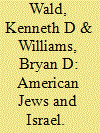

|
|
|
|
|
| Publication |
2006.
|
| Summary/Abstract |
What accounts for individual differences in the level of politicized ethnic identity among members of an ethnonational diaspora? By politicized ethnic identity, we refer to the disposition to assign priority to the interests of the homeland in the politics of the host society. The question presumes that even the most thoroughly mobilized of diasporas contain members who differ among themselves in the degree to which homeland matters predominate in determining political preferences and behavior. Using a 1999 survey of American Jewry, we establish the level of variation in the political salience of Israel to members of the community, then identify and test the factors that promote or retard such commitment.
|
|
|
|
|
|
|
|
|
|
|
|
|
|
|
|
| 3 |
ID:
101928
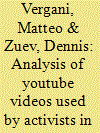

|
|
|
|
|
| Publication |
2011.
|
| Summary/Abstract |
This paper explores the uses of YouTube by Uyghur nationalist movement activists and studies various ideological codes used by different communities to promote their messages. It argues that several ideological codes are produced in order to challenge the dominant ideologies promoted by the Chinese government, which create a ground for Uyghur 'imagined solidarity' across physical borders. Analysis of the production of audio-visual messages by the dispersed ethnic group provides an important window into how ethnic identity is forged by means of Web 2.0.
|
|
|
|
|
|
|
|
|
|
|
|
|
|
|
|
| 4 |
ID:
090691
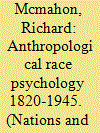

|
|
|
|
|
| Publication |
2009.
|
| Summary/Abstract |
This article examines ethnic stereotypes in biological race classification of Europeans between the 1830s and 1940s as part of political discourse on national identity. Anthropologists linked physical-psychological types to nations and national character stereotypes through 'national races', achieving an often quite enduring international consensus on each race's mentality. The article argues that race mentality narratives were therefore partly dictated by their place within a dynamic interlocking European system. I focus on two key interacting elements that structured this system: the central role of the Germanic-Nordic blond and the geographically uneven process of modernisation. I consider the spatiality of socio-cultural and political factors 'external' to the stereotype system, such as geopolitics and modernisation, but also emphasise that discursive relationships between national stereotypes helped structure the international stereotype system. My conclusion argues for greater consideration of the influence of both scientific and international systemic factors in research on national identity
|
|
|
|
|
|
|
|
|
|
|
|
|
|
|
|
| 5 |
ID:
139254
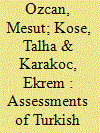

|
|
|
|
|
| Summary/Abstract |
Using original public-opinion polls and elite interviews conducted in 2012, this article analyzes the perceptions of Turkish foreign policy regarding the Arab Uprisings and the Syrian conflict in three Middle Eastern countries, Egypt, Iraq and Iran. It finds that ethnic, sectarian and religious groups in these three countries vary significantly in their views on Turkish foreign policy regarding both the Arab Uprisings and the Syrian conflict, although the same identity-related factors have a less salient effect at the elite level. The findings also suggest that the intersection of ethnicity and sect shapes people's attitudes toward Turkish foreign policy in Iran and Iraq. Sunnis, except for Kurds in Iran and Iraq, tend to have a positive view of Turkish foreign policy, while Shia Turkomans in Iraq tend to have a negative one.
|
|
|
|
|
|
|
|
|
|
|
|
|
|
|
|
| 6 |
ID:
068279
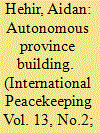

|
|
|
| 7 |
ID:
168854
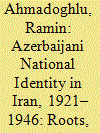

|
|
|
|
|
| Summary/Abstract |
This article examines the roots and development of Azerbaijani identity in Iran. This study aims to demonstrate that the Azerbaijani minority in Iran lacked consciousness of a distinct national identity at the dawn of the twentieth century, and argues that the driving force behind the emergence of the consciousness of Azerbaijani national identity in Iran was the Pahlavi regime’s repressive and exclusivist nationalist policies between 1921 and 1941. Building upon the grievances of the Pahlavi era, the occupation of Iran by Allied forces during the Second World War and the short, Soviet-supported autonomy under the leadership of Sayyed Ja’far Pishevari in 1945–1946 institutionalized and consolidated the Azerbaijani Turkish identity in Iran.
|
|
|
|
|
|
|
|
|
|
|
|
|
|
|
|
| 8 |
ID:
080565
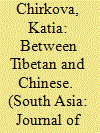

|
|
|
|
|
| Publication |
2007.
|
| Summary/Abstract |
This paper focuses on the ongoing process of changing local ethnic identities in the Southwest of China. The analysis is based on a comparison of two ethnic groups: Xumi and Baimi, both officially classified as Tibetans. While the experienced ethnic identity of the Xumi is in conformity with their official classification, the Baimi feel their own identity as being distinct from the classification imposed by the state. The related changes in local identities are examined with special emphasis on the role played by the Xumi and Baimi languages in creating and assessing group identity. I conclude that for both groups, albeit for various reasons, language is neither the major constructive element of ethnic boundaries nor an exclusive marker of ethnicity, which confirms Haarmaan's 1986 postulation that language is not a necessary criterion of ethnicity.
|
|
|
|
|
|
|
|
|
|
|
|
|
|
|
|
| 9 |
ID:
096684
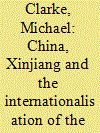

|
|
|
|
|
| Publication |
2010.
|
| Summary/Abstract |
This paper argues that Beiijing's handling of the Xinjiang and Uyghur issues at the domestic, regional and international levels is characterised by a number of contradictions. Domestically, the July 2009 unrest suggests that China's longstanding approach to Xinjiang is at risk of failure due to the contradictions inherent in the logic that underpins Beijing's strategy. Regionally, Beijing faces a contradiction between its growing influence on the governments of Central Asia and the ambivalent attitude of Central Asian publics towards China. Internationally, the major implication of the July unrest has been to signal the internationalisation of the Uyghur issue whereby it has become a significant irritant in Beijing's relations with a number of major Western states, including the USA and Australia. It has been Beijing's own approach to Xinjiang domestically and its handling of the Uyghur issue in its diplomacy that has contributed to the internationalisation of the issue.
|
|
|
|
|
|
|
|
|
|
|
|
|
|
|
|
| 10 |
ID:
066640
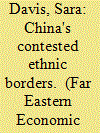

|
|
|
| 11 |
ID:
141162
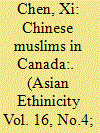

|
|
|
|
|
| Summary/Abstract |
To date, there has been little to no literature examining Chinese Muslim immigrants to Western nations. Recognizing the dearth of such literature, this research presents what appears to be the first-ever descriptive statistical picture of Chinese Muslims migrating to and residing in Canada. By examining how this immigrant population compares to and fares against non-Muslim Chinese and non-Chinese Muslims in Canada with Canadian census data in 1991 and 2001, the research provides preliminary analysis on the saliency of originating Chinese Muslim ethnicity in immigration outcomes. The current findings suggest that with the intersection of cultural and religious identities, Chinese Muslim may experience a different assimilation process compared to non-Muslim Chinese and non-Chinese Muslims.
|
|
|
|
|
|
|
|
|
|
|
|
|
|
|
|
| 12 |
ID:
078523
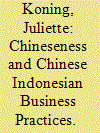

|
|
|
| 13 |
ID:
126659
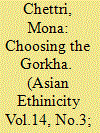

|
|
|
|
|
| Publication |
2013.
|
| Summary/Abstract |
The Darjeeling hills in northern West Bengal, India are being demanded as a homeland for the Gorkha community living in India. While the origin of Darjeeling is steeped in the imperial legacy of the British Raj, the Gorkha, a colonial construct is ironically used as a means to challenge the contemporary political regression and neo-colonisation of Darjeeling. Although the Gorkha identity is deemed as representative of the Nepali community residing in India, it acquires special meaning and importance in the Darjeeling hills, where majority of the people suffer low wages, unemployment, underdevelopment and poverty. In spite of a large working force in the tea estates, economic underdevelopment and political disempowerment is voiced through the assertion of ethnic rather than a class-based identity. Through an examination of the interaction between class and ethnicity, the Gorkha identity will highlight the malleability of ethnicity to extend itself to any situation and the emergence of an ethnic identity from class relations and grievances.
|
|
|
|
|
|
|
|
|
|
|
|
|
|
|
|
| 14 |
ID:
154719
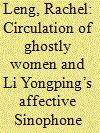

|
|
|
|
|
| Summary/Abstract |
Li Yongping’s writing displays an acute sensitivity to the changing cultural and historical positioning of the Sinophone Malaysian (Mahua) community and his own migratory experiences. This article focuses on Li’s incessant engagement with issues of gender and feminine sexuality in relation to the shifting biopolitical construction of a hybrid Sinophone Malaysian identity. Through an analysis of Li Yongping’s short story collection, The Snow Falls in Clouds (2002), I aim to examine how he deploys the trope of a prostitute figure to evoke the complexities of a Sinophone Malaysian identity and identification as a consistently reinvented affective product. Li’s keen awareness of the trafficking of desirable Chinese female bodies in Southeast Asia is inextricable from Sinophone Malaysia’s cultural history and community formation. Spectral feminine images reflect the increasingly porous and deterritorialized boundaries of citizenship, community, and nationalism complicating the concept of “Chineseness” and an affective Sinophone Malaysian subjectivity.
|
|
|
|
|
|
|
|
|
|
|
|
|
|
|
|
| 15 |
ID:
147659
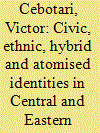

|
|
|
|
|
| Summary/Abstract |
While the topic of identity of ethnic minorities abounds in theoretical insights, most discussion is still clustered around the civic–ethnic divide while assuming conclusions with limited empirical evidence. By contrast, this article uses a four-category typology of identity that considers both in-group and out-group attachments to address hypotheses about competing identities and about factors influencing minorities to adopt one identity type over others. Based on unique data evidence of 12 ethnic minorities in Central and Eastern Europe, this study concludes that the ‘hybrid’ identity, rather than the literature-assumed ‘ethnic’ identity, tops the identification preference of minorities, although there are differences in levels and patterns when controlling for various covariates. The choice of identity depends on the socialisation process, the economic status, the perceived discrimination and intergroup tensions, reflecting variations in the system of values common to a region with complex ethnic dynamics.
|
|
|
|
|
|
|
|
|
|
|
|
|
|
|
|
| 16 |
ID:
152199
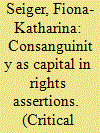

|
|
|
|
|
| Summary/Abstract |
This paper examines the material dimensions of ethnic identity claims by Japanese-Filipino children in the Philippines and non-governmental organizations (NGOs) advocating on their behalf. Most Japanese-Filipino clients of NGOs in the Philippines were raised by their Filipino families with little knowledge of their Japanese fathers and little or no lived experience of Japan. Although these children and young adults are often called “multi-cultural” by NGO workers, they frequently grow up with no connection to Japan other than an awareness of their Japanese parentage and Japanese cultural products equally accessible to most Filipinos. I argue that filiation can be leveraged to gain access to resources not only through the legal implications that are provided by biological relationships, but also through symbolically salient claims for belonging to a nation or people by virtue of descent. This consanguineal capital should primarily be understood in politically symbolic terms, mobilized in processes of claims-making and based on notions of “blood” and belonging and their frequent conflation with ethnicity.
|
|
|
|
|
|
|
|
|
|
|
|
|
|
|
|
| 17 |
ID:
147660
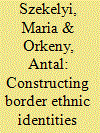

|
|
|
|
|
| Summary/Abstract |
The analysis is based on an empirical sociological study (interplay of European, National and Regional Identities: nations between states along the new eastern borders of the European Union Project) aimed at exploring the various aspects of people’s diaspora affiliations and their ethnic and national identity on the Eastern borderland of Europe. We surveyed ethnic minority groups in eight countries along the frontier of Central Eastern Europe. With the ethnic minorities having a similar ethnic status along the border, we demonstrated how ethnic minorities ‘deal’ with their minority status in their ‘host’ country. The analysis reconstructs the image of the ethnic minority at the societal level. We model personal and collective ethnic identities as a stock of knowledge based on cognitive and affective components, and test them along the different ethnic dyads. The paper shows how successive generations are able to transfer the pattern of ethnic identity within the family, and also how language use practices and personal networks play a role in preserving personal ethnic identity.
|
|
|
|
|
|
|
|
|
|
|
|
|
|
|
|
| 18 |
ID:
118539
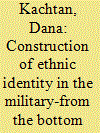

|
|
|
|
|
| Publication |
2012.
|
| Summary/Abstract |
This article examines how ethnicity is created, maintained, and perpetuated in the Israel Defense Forces (IDF). Research studies on ethnicity in the Israeli army have examined ethnicity while focusing on the macro, emphasizing the way the structure and the policy of the army, alongside its reciprocal relations with the greater society and the state, maintain and reproduce ethnicity. It focuses on the micro point of view, hitherto neglected, which emphasizes the soldiers' experience and interpretation. Using a case study of two Israeli infantry brigades, the article demonstrates how ethnicity is produced, maintained, and reproduced by individuals through practices, behavior, perceptions, and observations.
|
|
|
|
|
|
|
|
|
|
|
|
|
|
|
|
| 19 |
ID:
065688
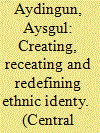

|
|
|
| 20 |
ID:
052467
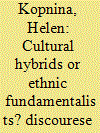

|
|
|
|
|
| Publication |
June 2004.
|
| Summary/Abstract |
This paper examines national and ethnic discourses within Singaporean small and medium enterprises (SMEs) and the ambiguities and dichotomies characterising Singaporean national and ethnic identity. Singapore is represented officially as a multi-ethnic state with a Chinese majority which claims to integrate minority groups such as Indians and Malays successfully, and it boasts a generalised Singaporean culture and identity that supposedly embrace the racial and ethnic diversity of the population. However, Singapore also hosts tensions and conflicts associated with such diversity. This paper examines workplace discourses which address tensions and congruencies. The paper is based on research conducted between April 2002 and May 2003, involving 50 SMEs representing various sectors of the economy and constituting various ethnicities. The research found that, while discourses on ethnicity and nationality may be characterised as somewhat 'shifting' and 'fluid', the respondents present their identities as rather fixed. Primordial ties rather than postmodern multiplicity may better characterise discourses among the workers and owners of Singaporean SMEs.
|
|
|
|
|
|
|
|
|
|
|
|
|
|
|
|
|
|
|
|
|